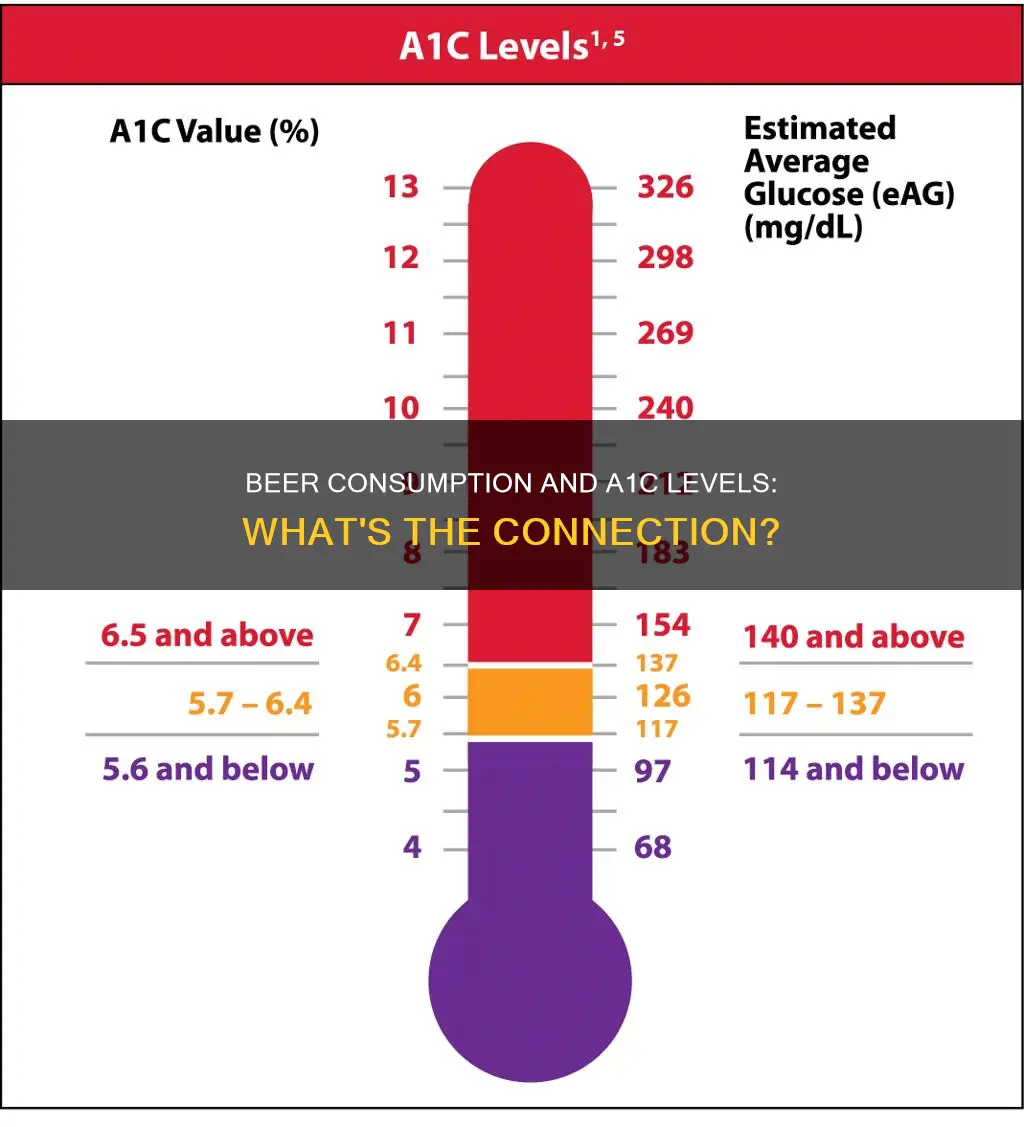
Alcohol can have a significant impact on blood sugar levels, which is a primary concern for people with diabetes. The liver, which is responsible for releasing glucose into the bloodstream, prioritises breaking down alcohol over its usual function of regulating blood sugar. This can lead to hypoglycaemia, where blood sugar levels drop dangerously low, causing symptoms such as headaches, irregular heartbeat, anxiety, and confusion.
The risk of hypoglycaemia is heightened for those with type 1 diabetes and type 2 diabetes patients using insulin. Alcohol also affects the body's ability to regulate blood sugar, and can cause weight gain and higher blood pressure. It can also interfere with diabetes medication, reducing its effectiveness.
However, moderate drinking (one drink a day for women, and up to two for men) may improve blood glucose management and insulin sensitivity, and lower A1C levels.
Therefore, while drinking alcohol is not necessarily off-limits for diabetics, it is generally recommended to drink in moderation, with food, and only when blood sugar levels are well-managed.
| Characteristics | Values |
|---|---|
| Effect on blood sugar levels | Alcohol can cause blood sugar levels to drop very low (below 70 mg/dL) or increase them too high. |
| Effect on appetite | Alcohol stimulates the appetite and may cause overeating. |
| Effect on medication | Alcohol may reduce the effectiveness of diabetes medication. |
| Effect on weight | Alcoholic drinks are often high in calories, which can cause weight gain. |
| Effect on liver | Alcohol interferes with the liver's ability to regulate the release of glucose into the bloodstream. |
| Effect on kidneys | Alcohol makes the kidneys work harder. |
| Effect on heart | Alcohol can increase the risk of heart disease and heart complications. |
| Effect on brain | Alcohol can cause short-term and long-term brain damage. |
| Effect on gut | Alcohol can cause gut inflammation and affect the gut microbiota. |
| Effect on nerves | Alcohol can cause nerve damage and increase the risk of neuropathy. |
| Effect on eyes | Alcohol may worsen eye damage caused by diabetes. |
What You'll Learn

Alcohol and diabetes medications
Alcohol can affect your blood sugar levels and impact your liver's ability to regulate blood sugar. It can also interact with diabetes medications, especially insulin and sulfonylureas, and cause hypoglycemia or "insulin shock", which is a medical emergency. Here are some things to keep in mind regarding alcohol and diabetes medications:
- Alcohol interacts with diabetes medications: Alcohol can cause blood glucose levels to rise or fall, depending on how much you drink. Some diabetes medications, such as sulfonylureas and meglitinides, also work by lowering blood glucose levels. Combining alcohol with these medications can lead to dangerous drops in blood sugar levels.
- Impact on the liver: The liver is responsible for regulating blood sugar levels and breaking down toxins like alcohol. When you drink alcohol, your liver prioritizes removing it from your bloodstream over regulating blood sugar. This can lead to unstable blood sugar levels, especially if you drink on an empty stomach.
- Risks of hypoglycemia: Alcohol can increase the risk of hypoglycemia, or low blood sugar. This is particularly dangerous as the symptoms of hypoglycemia, such as slurred speech and drowsiness, can be similar to the symptoms of being drunk, making it difficult to distinguish between the two.
- Medications to be cautious with: Metformin, a common medication for type 2 diabetes, can potentially interact with alcohol and cause harmful effects, including life-threatening hypoglycemia and lactic acidosis. It is important to consult your doctor if you are taking metformin and want to consume alcohol.
- Precautions to take: If you choose to drink alcohol, it is important to follow certain precautions. These include not drinking on an empty stomach, always having food before or after drinking, staying hydrated, and regularly monitoring your blood sugar levels.
- Guidelines for drinking: It is recommended that men have no more than two drinks per day and women have no more than one drink per day. It is also important to discuss your drinking habits with your doctor to get personalized advice and ensure that drinking alcohol is safe for you.
Drinking Four Beers in Four Hours: Safe or Not?
You may want to see also

Alcohol's effect on blood sugar levels
Alcohol can have a significant impact on blood sugar levels, particularly for those with diabetes. The liver, which is responsible for releasing glucose into the bloodstream to maintain normal blood sugar levels, has to prioritise breaking down alcohol instead of releasing glucose when an individual consumes alcoholic drinks. This can cause a rapid drop in blood sugar levels, a condition known as hypoglycemia. Hypoglycemia can lead to symptoms such as headaches, irregular heartbeat, anxiety, confusion, and even seizures if blood sugar levels drop low enough.
The risk of hypoglycemia is higher for those with type 1 diabetes and type 2 diabetes patients using insulin. Additionally, alcohol can affect the hormones that regulate blood sugar levels and decrease insulin sensitivity, further disrupting the body's ability to regulate blood sugar effectively. Alcohol also stimulates the appetite, often leading to overeating and disrupting blood sugar control.
The effects of alcohol on blood sugar levels can be seen up to 12 hours after the last drink. The more drinks consumed, and the higher the alcohol content, the higher the risk of hypoglycemia. Therefore, it is recommended to drink in moderation and preferably with food to help maintain normal blood sugar levels.
For individuals with diabetes, drinking alcohol can also interfere with diabetes medications, making them less effective. Alcohol can also worsen diabetes-related complications such as disturbances in fat metabolism, nerve damage, and eye disease. Additionally, alcoholic drinks, especially beer and sweetened mixed drinks, tend to be high in carbohydrates and calories, which can further elevate blood sugar levels and contribute to weight gain, making it more challenging to manage diabetes.
While moderate alcohol consumption may not be harmful for most people, those with diabetes should exercise caution. It is essential to consult with a healthcare provider to understand the risks and take appropriate steps to prevent problems.
Nursing and Alcohol: Is One Beer Safe?
You may want to see also

Alcohol's impact on weight gain
Alcohol can have a significant impact on weight gain, and excessive alcohol consumption is a well-known cause of obesity. Alcoholic drinks are often referred to as "empty calories", providing your body with calories but very few nutrients. For example, a 12-ounce can of beer contains almost 155 calories, and a 5-ounce glass of red wine contains 125 calories. Drinks with mixers like fruit juice or soda are even higher in calories.
Alcohol is burned by the body as a fuel source before glucose from carbohydrates or lipids from fats, and this can lead to weight gain. Alcohol can also affect your organs, particularly the liver, which plays a role in metabolising fats, carbohydrates, and proteins. Excessive alcohol consumption can lead to alcoholic fatty liver, which can damage your liver and affect the way your body metabolises and stores energy from food, making it difficult to lose weight.
Alcohol can also contribute to excess belly fat, as the body tends to accumulate fat in the abdominal area. It can also affect your judgment, leading to poor food choices, and it can trigger hunger signals in the brain, leading to an increased urge to eat. Alcohol intake can also affect levels of hormones in the body, particularly testosterone, which plays a role in fat-burning capabilities.
In addition, alcohol can negatively affect your sleep, and sleep deprivation can lead to an imbalance in the hormones related to hunger, satiety, and energy storage. Alcohol can also inhibit proper digestive function, leading to decreased digestive secretions and movement of food through the tract, which can affect the metabolism of organs that play a role in weight management.
Overall, while moderate alcohol consumption may not significantly impact weight gain, heavy drinking is more consistently related to weight gain.
Beer and Brain Damage: Is There a Link?
You may want to see also

Alcohol's effect on the liver
When the liver breaks down alcohol, it creates substances that are more harmful than alcohol itself. Large amounts of these substances can damage liver cells and cause serious liver disease. Excessive alcohol consumption can lead to three types of liver disease:
- Fatty liver or hepatic steatosis, where fat builds up in the liver and prevents it from functioning properly. This is the earliest stage of alcohol-related liver disease and is reversible if treated early by stopping drinking.
- Alcoholic hepatitis, where the liver becomes inflamed and swollen, and liver cells are destroyed. This can be mild or severe; the mild form can lead to more liver damage unless drinking is stopped, while severe alcoholic hepatitis is life-threatening and usually occurs after binge drinking.
- Alcohol-related cirrhosis, where healthy liver tissue is replaced by scar tissue. This is usually irreversible and can lead to fatal liver failure or liver cancer.
The risk of liver damage from alcohol can be reduced by cutting down or giving up alcohol. All liver diseases can improve or be prevented by abstaining from alcohol. Maintaining a healthy weight, exercising regularly, eating a balanced diet, and getting sunlight are also recommended to reduce the impact of liver disease.
It's important to note that there is no safe level of drinking when it comes to liver health. However, moderation is key, and it's advisable to review alcohol consumption with a healthcare provider. Women tend to develop liver disease faster than men when consuming the same amount of alcohol. The recommended drinking limits in the UK are not to regularly drink more than 14 units a week, spread over at least three days.
Stroke Patients and Beer: What's Safe to Drink?
You may want to see also

Alcohol's effect on other organs
Alcohol has a detrimental effect on many organs in the body, apart from the liver and the brain. Here is a list of some of the organs affected by alcohol and the consequences of alcohol consumption on them:
Heart
Chronic alcohol consumption can lead to various cardiovascular diseases, including cardiomyopathy, cardiac arrhythmias, hypertension, atherosclerosis, and heart failure. Heavy drinking can cause stretching and drooping of heart muscles, irregular heartbeats, and high blood pressure. It can also lead to alcoholic cardiomyopathy, which is caused by the left ventricle's dysfunction. This can result in a reduced ejection fraction and decreased contractility of the heart.
Pancreas
Alcohol causes the pancreas to produce toxic substances, which can lead to pancreatitis, a dangerous inflammation of the pancreas that causes swelling and pain. Pancreatitis can impair the pancreas's ability to produce enzymes and hormones necessary for proper digestion.
Immune System
Drinking too much alcohol can weaken the immune system, making the body more susceptible to diseases like pneumonia and tuberculosis. Alcohol interferes with the body's ability to ward off infections, even up to 24 hours after getting drunk.
Kidneys
Heavy alcohol consumption can lead to kidney problems, as seen in people with alcohol-induced pancreatitis or acute hepatitis.
Cancer
According to the National Cancer Institute, there is a strong link between alcohol consumption and an increased risk of developing certain types of cancer, including head and neck cancer, esophageal cancer, and breast cancer.
Peripheral Neuropathy
Alcohol consumption is one of the leading causes of peripheral neuropathy, along with diabetes. It can cause damage to the nerves that extend from the spinal cord, resulting in symptoms such as tingling, burning, pain, and numbness in the legs and feet.
Grapefruit Beer and Lipitor: A Safe Mix?
You may want to see also
Frequently asked questions
No research shows a direct link between alcohol and diabetes. However, studies have found that drinking, especially heavy drinking, can increase your risk of getting diabetes.
Alcohol can affect your blood sugar levels immediately after drinking, and its effects can be seen up to 12 hours after you’ve consumed your last drink. Beer can increase blood glucose levels as it contains carbohydrates, which get absorbed into the bloodstream relatively quickly. Drinking a lot of beer can also reduce blood glucose levels, causing hypoglycemia.
Alcohol may interfere with hypoglycemic medications, making them less effective.
For most people, there’s no harm in indulging in a few drinks once in a while. But the amount that constitutes this ‘moderate drinking’ can vary for everyone. According to the Dietary Guidelines for Americans, it is recommended that men have no more than two alcoholic drinks per day and women have no more than one.







